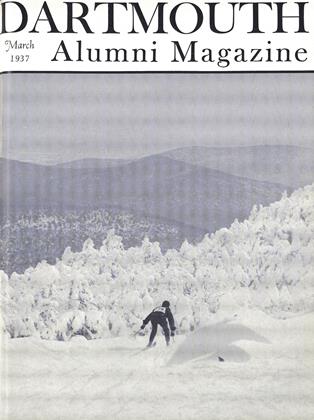Carnival was on the whole a well ordered week-end. The few offenders who were at the base of disorders in several houses, almost invariably were found to be out- of-town visitors. The problem they created, which has often been raised before, was accentuated by the greater crowds that poured into Hanover. It would seem now that some definite solution must be reached before another Carnival, as the present situation not only hurts the reputation of Dartmouth, but seriously interferes with the undergraduate enjoyment of the weekend.
The immediate reaction is to suggest limiting the advance publicity that goes out from the Outing Club. Let the D. O. C. give up part of its gate receipts in favor of a more orderly Carnival, perhaps even a Carnival for Dartmouth men alone. Unfortunately the issue is deeper than that, and cannot be passed on to the Outing Club alone, for there is a big question whether the undesirable element is attracted by publicity at all, or comes at the invitation of Dartmouth undergraduates. Fraternities have had trouble with brothers from other chapters. Perhaps such disturbances are necessary drawbacks to any large social event, with football games cited as an example. Nevertheless, the issue . . . . and to talk with individuals in Hanover the week after Carnival leaves little doubt that there is an issue . . . . must be faced squarely. The Outing Club Council has gone into the matter at some length and has signified a strong desire to cooperate. Palaeopitus is considering the problem. It would seem essential that the Administration join the undergraduate organizations in adopting a consistent and satisfactory policy to eliminate one of the major drawbacks of Hanover's most popular week-end.
The Dartmouth Glee Club singing before a crowded hall during Carnival made one of the most pleasant features of the week-end. Dressed in borrowed ski jackets and a somewhat outmoded style of ski pants, the club sang many Hanover favorites which lent a deep touch of true Dartmouth winter atmosphere.
This spring the Glee Club will sing essentially the same songs when it combines with the Barbary Coast for the first long tour in seven years. The forty-six men making the trip will sing and play at Washington, D. C., Pittsburgh, Chicago, Detroit, and other cities en route. Hindered by an inability to get high enough guarantees to cover the expense of transporting such a large body of men, the Glee Club has been restricted to shorter trips since 1930.
 View Full Issue
View Full Issue
More From This Issue
-
 Article
ArticleYANKEE INGENUITY HAS NOT ENTIRELY DISAPPEARED, A TALE OF "AUSTIN'S ANTS" AND THEIR ANTICS
March 1937 By JOHN HURD JR. '21 -
 Class Notes
Class NotesClass of 1930
March 1937 By Albert I. Dickerson -
 Class Notes
Class NotesClass of 1926
March 1937 By Charles S. Bishop -
 Class Notes
Class NotesClass of 1936
March 1937 By Richard F. Treadway -
 Class Notes
Class NotesClass of 1911
March 1937 By Nathaniel G. Burleigh -
 Article
ArticleHanover Browsing
March 1937 By HERBERT F. WEST '22
William B. Rotch ’37
-
 Letters to the Editor
Letters to the EditorLetters
Mar/Apr 2006 -
 Article
ArticleMUSICAL SEASON OPENED
January 1937 By William B. Rotch ’37 -
 Article
ArticleJACKO SHOWS NEW TREND
March 1931 By William B. Rotch ’37 -
 Article
ArticleMILESTONES
March 1931 By William B. Rotch ’37 -
 Article
ArticleFREE HEALTH SERVICE
April 1937 By William B. Rotch ’37 -
 Class Notes
Class Notes1937
MAY 1963 By William B. Rotch ’37, JEROME H. LOW
Article
-
 Article
ArticleHANOVER RECORDS
FEBRUARY 1906 -
 Article
ArticleDARTMOUTH 52 COLUMBIA 0-DARTMOUTH 7 HARVARD 2
November, 1930 -
 Article
ArticleREPORT OF THE ALUMNI FUND—APRIL 20, 1931
MAY 1931 -
 Article
ArticleTHEODOR SEUSS GEISEL
March 1938 -
 Article
ArticleHanover Browsing
November 1950 By HERBERT F. WEST '22 -
 Article
ArticleOld Tradition, New Support
Mar/Apr 2003 By Kate Lilienthal '88


